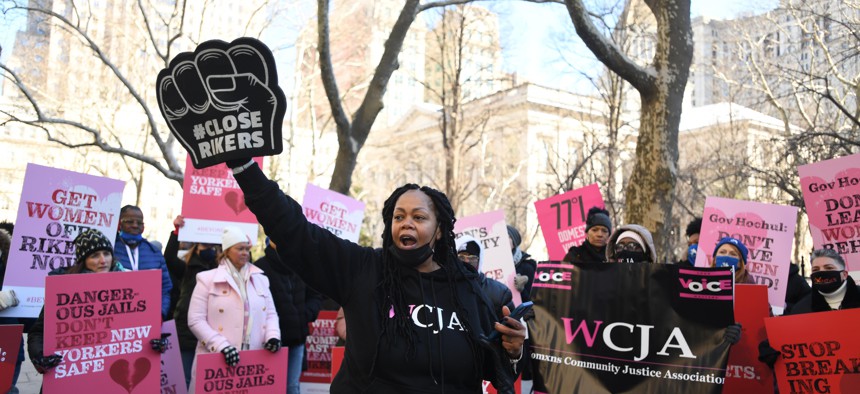Opinion: Replace Rose M. Singer Center with community-based alternatives to incarceration and a Women’s Center for Justice
With more decarceration efforts that addresses the needs of women and gender-nonconforming individuals, New York can set the stage for closing Rikers Island.

Women's Community Justice Association
Growing up, I was the girl in the church pews, the honor roll student studying nursing, the good daughter and sister. That is how it looked on the outside. Inside, I was broken by the domestic violence in my home. When I turned 18, the cycle began to repeat itself when I fell in love with a man who became abusive. Two years later, we had a son together, and it became even more difficult to leave.
Before my boyfriend came into the picture, I had never been in trouble, but he got me involved in dangerous situations. One horrible night in 1996, I had a conflict with a family associate and it became physical. I pulled out my boyfriend’s gun to scare him, but he charged at me, and in a panic, I shot him.
That is how I ended up at the Rose M. Singer Center on Rikers Island, where a new cycle of abuse began. When I arrived, the new group of women with me was ordered to strip naked for a body search. For three years, the dehumanizing treatment continued as I waited for my trial. There was constant fear, and sometimes I locked myself in my cell for my own protection. Going to Bedford Hills Correctional Facility after being convicted was actually a relief, because at least there was some feeling of safety and care at that facility.
Now, I regularly visit Rosie’s as an advocate, and not much has changed in terms of who is inside. Like me, 77% are domestic violence survivors, 80% are mothers, and the majority are from the Black and brown communities most devastated by mass incarceration. However, the conditions have gotten worse. Between staffing shortages and COVID-19, women and gender-nonconforming people are confined to their units, unable to see their families, and staying there longer because of court delays.
As we celebrate Women’s History Month, we must not forget the most vulnerable at Rosie’s who have been neglected and left behind. The city’s plan to shut Rikers has this small group of under 300 among the last to leave, five years from now. They would be relocated to a new Kew Gardens facility that opens in 2027 and is potentially worse than Rikers. At least Rosie’s is a stand-alone building for women and gender-nonconforming people – at the Kew Gardens jail, there would be shared spaces and staff with the men.
In October, there was a glimmer of hope that things could change when Gov. Kathy Hochul began transfers from Rosie’s to Bedford to address the humanitarian crisis at Rikers. However, last month, women were returned without improvements for their safety or a better long-term plan.
Hochul and New York City Mayor Eric Adams can make history for the mothers, daughters and sisters at Rikers. More can be released back to their communities, and the small remaining population deserves a humane facility that is separate from men – a Women’s Center for Justice. The governor can transfer a closed state correctional site in Manhattan – either Lincoln in Harlem or Bayview in Chelsea – to the city for this purpose, as recommended by Judge Jonathan Lippman,who is chair of the Independent Commission on New York City Criminal Justice and Incarceration Reform, and the Mayor’s Social Justice Commission.
The population can be shrunk with more decarceration efforts that target the unique needs of women and their families. In May 2020, there were 142 people at Rosie’s, and community-based alternatives can make the number even lower and save taxpayer money.
Lincoln or Bayview can be transformed into a Women’s Center for Justice for those who remain. It can use a transformative approach to safety and break the cycle of incarceration with holistic care that addresses the specific root causes of system involvement for women and gender-nonconforming people. The model would be “Reentry at Entry,” and from day one, focus on community reintegration, family unity and skills building.
New York can create a gold standard for justice-involved women nationally and set the stage for closing the rest of Rikers Island. The mayor and governor can make this March a historic Women’s History Month by securing Lincoln or Bayview for those at Rose M. Singer Center on Rikers.
NEXT STORY: Nonprofit BoardCon returns in person